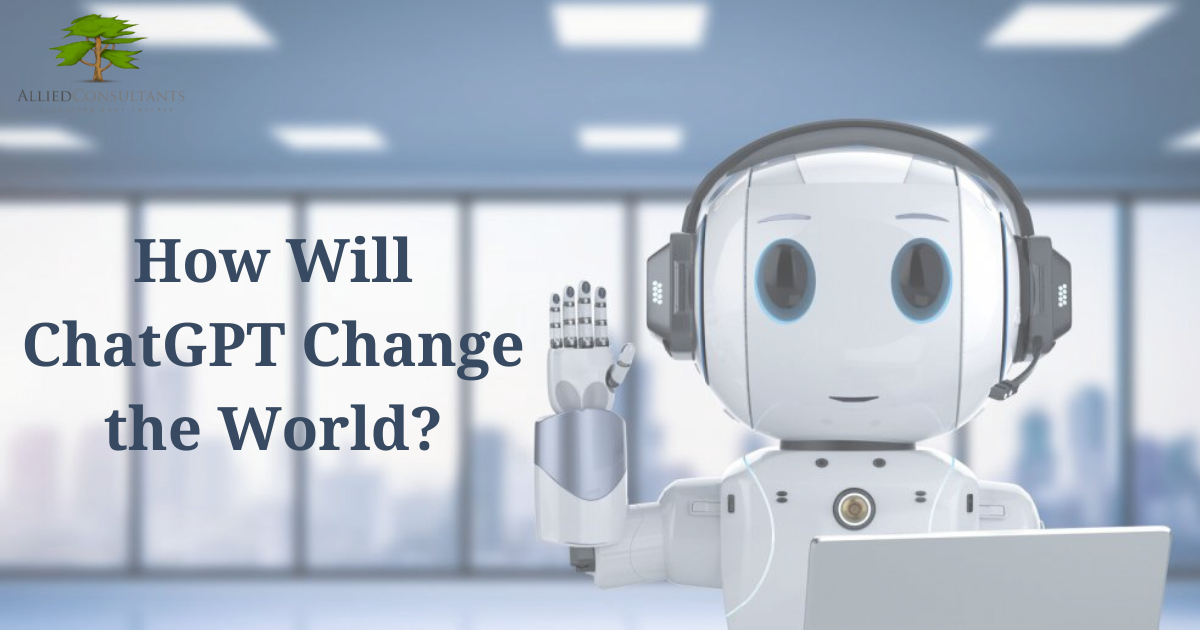From Text To Talk: How Will ChatGPT Change the World?
Every once in a while, a brand-new application emerges, making everyone excited (and possibly afraid) about the potential of artificial intelligence (AI). ChatGPT, a conversational AI interface based on the GPT-3 large language model, is, without a doubt, the talk of the town. The ChatGPT can produce nearly human-like quality output, unlike anything before it.
Every time AI makes headlines, it prompts discussions if it will eliminate human’s role in performing specific jobs. According to the World Economic Forum, although some positions may become obsolete, individuals won’t. Rather than areas where ChatGPT or similar technologies can create unique thought, they are areas where technology can be applied to enhance professional abilities and improve output and efficiency.
This has the advantage of freeing up our time to focus on learning and using talents that machines don’t yet have and probably won’t have for some time. They include skills that need emotional intelligence and empathy, innovation, complicated problem-solving, and strategy.
Before diving into further discussion, let it be clear what chatGPT actually is.
What Is ChatGPT?
The chatbot ChatGPT was introduced late last year by OpenAI, a business Sam Altman and Elon Musk initially helped co-found. The language technology used by the bot is OpenAI’s GPT-3.5, an update of the GPT-3 model introduced in 2020. In its first week, ChatGPT had over a million users. OpenAI developed ChatGPT, which is a significant language model designed to understand and generate human-like responses for text-based conversations. It has been trained on a massive dataset of diverse text, enabling it to create responses to a wide range of questions and topics.
What Can I Do With ChatGPT?
You can use ChatGPT for a variety of purposes, including:
- ChatGPT can provide solutions and information to help with a problem or satisfy curiosity about a specific topic.
- Generating content: If you’re a writer, blogger, or content creator, ChatGPT can help you create ideas, outlines, and even complete sentences or paragraphs.
- Learning and education: ChatGPT can provide explanations and insights on various topics, making it a valuable tool for learning and teaching.
- Entertaining and engaging: ChatGPT can engage in fun and exciting conversations, play games, or even tell jokes, making it fun and entertaining to spend time with.
- As an alternative to Google searches.
6 Roles That ChatGPT Is Most Likely to Revolutionize
What professions have the most significant potential to benefit from ChatGPT? It’s crucial to understand that this isn’t a list of positions that I believe ChatGPT will completely replace (or other natural language technologies). Instead, they are ones where technology can be applied to improve professional abilities and increase output and efficiency.
If you hold one of these positions, it will benefit you to think about how exciting it is to have the chance to use cutting-edge technology in your daily work. Yet, as we enter the era of artificial intelligence, it also presents an opportunity to develop human talents that are likely to become more and more crucial for career advancement.
1. Lawyer
ChatGPT and related applications can help attorneys or lawyers by producing papers like contracts or agreements, summarizing case notes and pertinent laws and statutes, and reducing the time spent conducting research and typing up documents. Professionals can utilize this time to meet with clients directly, settle disputes with rival parties and their lawyers, question witnesses, and formulate legal plans. Ultimately, this will help them become more valuable in a professional position by enabling them to provide their clients with more useful and efficient services.
2. Copywriter
Businesses pay copywriters to produce captivating and exciting material to promote their products. Companies are unlikely to want ChatGPT or similar technologies to create their advertisements and slogans because unique thinking is still required to stand out from the crowd, and ChatGPT is incapable of creative and original thought. Everything it creates is based on existing knowledge; it simply rearranges the data so it looks new.
The human touch is still necessary for good copywriting and will likely take time to convey personality, meaning, and brand voice effectively. Nonetheless, ChatGPT can undoubtedly offer guidance on recognizing these components and making the text more amusing or engaging. Skilled copywriters may use ChatGPT to incorporate previously created slogans, messaging, or wordplay when creating sentences, straplines, & calls to action.
3. Journalist
Journalism was one of the first industries to benefit from AI. However, media sources have long used AI to generate automated reports, including simple, templated journalism, such as financial and sports reporting. Though advanced technology like ChatGPT can create automated content, but professional journalists still avoid using it to write entire articles.
Likewise with copywriters, if journalists don’t have fresh ideas of their own, their audiences will lose interest in what they are writing very quickly. However, writers can use ChatGPT or similar technologies to create article summaries, headlines, and features such as checklists of critical topics that need to be covered.
4. Computer Programmer
Did you know ChatGPT can generate code in various programming languages like Python, JavaScript, C++, and human? However, it can’t (yet) build particularly complicated programmes, as would be necessary to create contemporary software applications. This is good news for computer programmers who might not want to retrain for a different career. If your job involves creating computer codes, it can be beneficial for developing modern software applications. It can also check for faults and errors in existing codes.
5. Human Resources
ChatGPT is a tool that HR managers may use to develop job descriptions and automate repetitive operations, including reporting on performance reviews, responding to candidate inquiries, and producing onboarding materials for new hires. Organizations can use chatbots and conversational interfaces to handle routine questions, such as where to obtain policy documents, as well as more complex queries that require an understanding of policies.
In addition, businesses can use ChatGPT for activities such as sentiment analytics to understand how workers talk about the company on social media or to gain insights into what potential new hires think about the business. As they’re doing this, HR professionals can spend time having one-on-one conversations with the people who make up the organization to build a better understanding and learn about the challenges they face.
6. Data Analyst
ChatGPT can assist by providing suggestions on visualizing the data, such as recommending the best type of charts to use and identifying specific data points to include. However, it cannot create visualizations itself as it is a language model. Natural language AI can tailor reports and statistics to individual audiences (marketing departments or c-suite) and format and order data within tables. Natural language AI can organize and arrange data in tables and customize reports and statistics to specific audiences (such as marketing departments or the c-suite).
Key Takeaways:
As an AI language model, ChatGPT has the potential to change the way people work in many ways. Here are a few examples:
Improving productivity: It can help automate tasks, such as scheduling meetings, answering emails, or generating reports. This can help free up time and resources, allowing people to focus on more important tasks.
Enhancing creativity: ChatGPT can be used to generate new ideas, concepts, and solutions to problems, helping to stimulate creativity and innovation in the workplace.
Providing real-time support: It can provide instant support and assistance to employees, customers, or clients. This can help improve customer service and satisfaction and reduce response times and waiting periods.
Enhancing collaboration: ChatGPT can help facilitate collaboration between team members, providing real-time access to information and expertise. This can help improve communication and collaboration and increase efficiency and productivity.
Ultimately, ChatGPT has the power to change the way individuals do their jobs entirely. We can anticipate that AI technology will undergo considerably greater developments and changes in the future.







